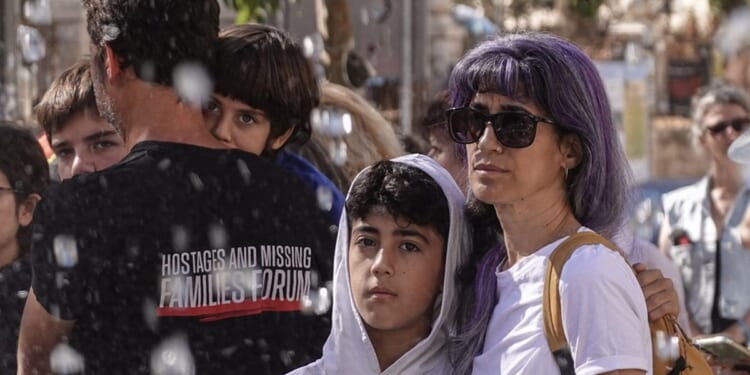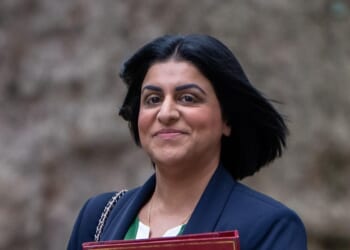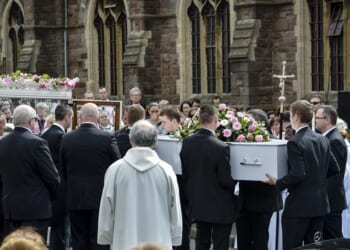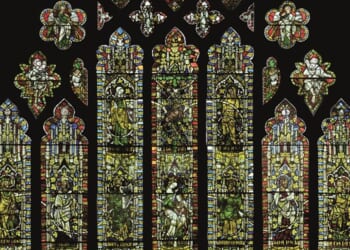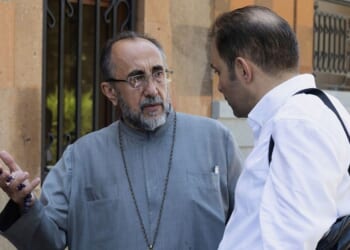THE Archbishop of York marked the second anniversary of the 7 October Hamas attacks on southern Israel with a prayer for healing, for the release of the remaining hostages, and for peace in the region.
And, at a mass in St Peter’s Square on Sunday, Pope Leo XIV called on political leaders to commit themselves to peace negotiations, which, he said, had shown “significant steps forward”.
On Tuesday, it was reported that indirect talks between Hamas and Israel were taking place, to consider the terms of a new plan put forward by President Trump (News, 3 October).
About 1200 people were killed at locations including the site of the Nova music festival and kibbutzim near the border with Gaza during the attacks on 7 October 2023. Of the 251 hostages taken, 20 are still held by Hamas.
Israel responded with a bombardment of the Gaza Strip which has continued for two years. Health officials in Gaza report that more than 67,000 people have been killed, most of them by air strikes. Some international studies suggest that the casualty figures are significantly underestimated.
Archbishop Cottrell published a prayer for peace on Tuesday morning, writing on social media: “Today we pause to remember October 7 — a day of pain and loss.”
Reflecting on the anniversary, the Dean of St George’s College, Jerusalem, the Very Revd Canon Richard Sewell, said that it had been “two long years of horrors” in Gaza, during which children and women had been “bombed in their homes and in their streets, with nowhere safe to hide”.
He recalled the “horrendous events” of 7 October. “At the time, we had a group of 33 pilgrims staying at St George’s College in Jerusalem. We did not evacuate them immediately, believing the crisis would pass soon. However, a week later we safely packed them on to flights back to their homes,” he said.
Since then, St George’s has been unable to welcome any pilgrimage groups, though several bishops have visited the diocese, which covers Israel and occupied Palestinian territory, in the past two years.
There had been “rapidly escalating worsening conditions” across the occupied West Bank, exacerbated by the drop-off in tourism, Dean Sewell said. Many Israeli work permits held by Palestinians living in the occupied West Bank had been rescinded, and this had worsened the economic situation in the territory.
A rising number of Palestinians were held in “administrative detention” without being charged with a crime, and there had been an increase in the number of Israeli settlements being built in defiance of international law.
“Increasing settler attacks upon vulnerable Palestinian villages has caused a widespread sense of fear. These attacks are almost never investigated or prosecuted by Israel,” Dean Sewell said.
Despite all this, there had been “some grounds for encouragement”, he said. “The mass marches in London and many other cities of the world have demonstrated that the plight of the Gazans and Palestinians in general has not been forgotten by the people of the world, even if their governments have largely been spineless.”
On Tuesday, the Prime Minister suggested that anti-war demonstrations scheduled for 7 October were “un-British”.
Writing in The Times, Sir Keir Starmer said that it was “un-British to have so little respect for others. And that’s before some of them decide to start chanting hatred towards Jewish people all over again.”
He said that anti-Semitism in the UK had risen since 7 October, and that “for too long, our country has been too indifferent to antisemitism.”
The Vatican Secretary of State, Cardinal Pietro Parolin, said that the Hamas attacks were “inhuman and indefensible”.
On the Israeli response to the attacks, and the continuing bombardment of Gaza, Cardinal Parolin told Vatican News that “those who are attacked have a right to defend themselves, but even legitimate defence must respect the principle of proportionality.
“Unfortunately, the resulting war has brought about disastrous and inhuman consequences . . . people killed while trying to find a piece of bread, buried under the rubble of their homes, bombed in hospitals, in tent camps, displaced and forced to move from one end of that narrow, overcrowded territory to another. It is unacceptable and unjustifiable.
“We continue to ask that this perverse spiral of hatred and violence, which risks dragging us into an abyss with no return, come to an end,” the Cardinal said.

